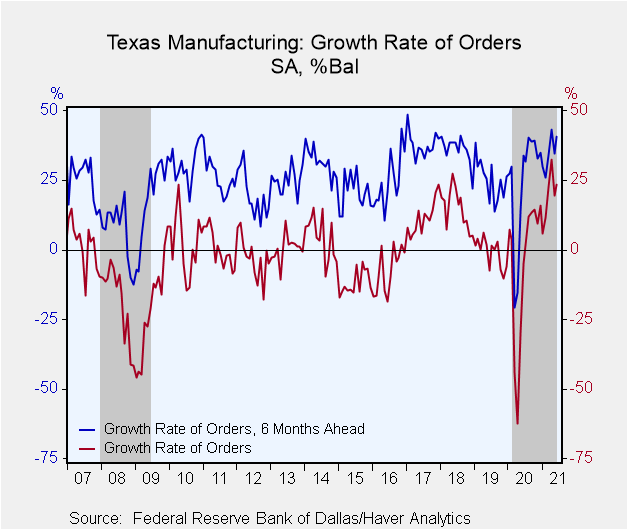 Global| Jun 28 2021
Global| Jun 28 2021Texas Manufacturing Growth Continues and Outlook Improves in June
by:Tom Moeller
|in:Economy in Brief
Summary
• Current production & orders growth pick up; employment remains strong. • Pricing power strengthens. The Texas Manufacturing Outlook Survey, conducted by the Federal Reserve Bank of Dallas, indicated that its General Business [...]
• Current production & orders growth pick up; employment remains strong.
• Pricing power strengthens.
The Texas Manufacturing Outlook Survey, conducted by the Federal Reserve Bank of Dallas, indicated that its General Business Activity Index fell to 31.1 in June from 34.9 in May. A lessened 43.1% of respondents reported improved business activity this month, but the Q2 average of 45.6% was improved from 31.6% in Q1. A slightly lessened 12.0% of respondents reported that conditions had worsened in June while 11.2% reported deterioration in the quarter, down from 13.9% in Q1. The survey was conducted from June 15-23 amongst 104 Texas manufacturers.
The growth rate of production reading picked up to 29.4 after falling to 15.7 in May. The figure remained well below the March high of 48.0. The new orders growth index rose to 23.4 from 19.5 in May. Both figures remained below April's record of 32.3. (These series date back to June 2004.) A lessened 37.0% of respondents reported faster new orders growth. The employment index improved slightly to 22.9 as did the quarterly average to 25.6, up from 16.0 in Q1. A higher 31.8% of firms reported more hiring this month while 8.9% reported less. Wages & benefits surged to a record 48.1 as 49.0% of respondents paid higher wages, up from 28.7 three months ago. The production index reading of 29.4 left the Q2 average at 26.4, the highest level in three years. The shipments measure improved as did unfilled orders.
The finished goods prices measure strengthened to a record 42.8. The June figure reflected a record 44.6% of respondents reporting higher prices while 1.8% reported price declines. The index of prices paid for raw materials rose to a record 80.8.
The headline reading of expectations for overall business activity in six months strengthened to 37.3 after easing to 31.4 in May. The expected employment measure remained at the record high, while expected hours-worked strengthened significantly. Expectations for production strengthened as did expectations for new orders growth. Expected wages strengthened to a near-record high.
Each index is calculated by subtracting the percentage reporting a decrease from the percentage reporting an increase. When all firms report rising activity, an index will register 100. An index will register -100 when all firms report a decrease. An index will be zero when the number of firms reporting an increase or a decrease is equal. Data for the Texas Manufacturing Outlook can be found in Haver's SURVEYS database.
| Texas Manufacturing Outlook Survey (SA, % Balance) | Jun | May | Apr | Jun '20 | 2020 | 2019 | 2018 |
|---|---|---|---|---|---|---|---|
| Current General Business Activity Index | 31.1 | 34.9 | 37.3 | -5.4 | -10.6 | -1.2 | 25.8 |
| Production | 29.4 | 15.7 | 34.0 | 14.8 | 3.7 | 8.9 | 21.4 |
| Growth Rate of New Orders | 23.4 | 19.5 | 32.3 | -5.0 | -5.3 | -1.1 | 14.8 |
| Employment | 22.9 | 22.7 | 31.3 | -0.4 | 1.6 | 9.5 | 20.0 |
| Wages & Benefits | 48.1 | 39.0 | 37.1 | 7.1 | 11.5 | 23.5 | 29.7 |
| Prices Received for Finished Goods | 42.8 | 38.4 | 39.1 | -3.9 | -1.7 | 2.5 | 17.6 |
| General Business Activity Index Expected in Six Months | 37.3 | 31.4 | 36.6 | 20.1 | 6.6 | 6.4 | 31.6 |
| Production | 56.6 | 47.6 | 47.2 | 39.2 | 31.3 | 35.6 | 48.6 |
| Growth Rate of New Orders | 40.6 | 34.4 | 43.2 | 33.9 | 23.9 | 25.2 | 35.8 |
| Employment | 48.2 | 47.6 | 48.2 | 19.1 | 15.5 | 26.0 | 37.7 |
| Wages & Benefits | 59.2 | 56.4 | 49.9 | 22.0 | 26.7 | 39.7 | 50.4 |
Tom Moeller
AuthorMore in Author Profile »Prior to joining Haver Analytics in 2000, Mr. Moeller worked as the Economist at Chancellor Capital Management from 1985 to 1999. There, he developed comprehensive economic forecasts and interpreted economic data for equity and fixed income portfolio managers. Also at Chancellor, Mr. Moeller worked as an equity analyst and was responsible for researching and rating companies in the economically sensitive automobile and housing industries for investment in Chancellor’s equity portfolio. Prior to joining Chancellor, Mr. Moeller was an Economist at Citibank from 1979 to 1984. He also analyzed pricing behavior in the metals industry for the Council on Wage and Price Stability in Washington, D.C. In 1999, Mr. Moeller received the award for most accurate forecast from the Forecasters' Club of New York. From 1990 to 1992 he was President of the New York Association for Business Economists. Mr. Moeller earned an M.B.A. in Finance from Fordham University, where he graduated in 1987. He holds a Bachelor of Arts in Economics from George Washington University.
More Economy in Brief
 Global| Feb 05 2026
Global| Feb 05 2026Charts of the Week: Balanced Policy, Resilient Data and AI Narratives
by:Andrew Cates










